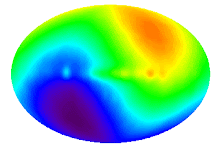Exposure to a Social
Stressor Alters the Structure of the Intestinal Microbiota: Implications for
Stressor-Induced Immunomodulation
The external surfaces
of the body are colonized by vast arrays of microbes that outnumber cells of
the body by a factor of 10 (i.e., 1014 bacterial cells to 1013
human cells). This means that 90% of the cells of our body are our commensal
microbiome. The vast majority of these microbes reside in the intestines as
part of the intestinal microbiota, with microbiota levels ranging from < 105
bacteria per gram of digesta in the upper parts of the small intestine, to >
1012 bacteria per gram of digesta in the large intestine
Many of these bacteria
are simple opportunistic colonizers, while the majority are true symbiotic
organisms in the sense that they have beneficial interactions with each other
and the host. For example, many metabolic activities in the intestines are
derived from the microbiota, such as the synthesis of vitamin K and vitamin B
complex and the metabolism of carcinogens

沒有留言:
張貼留言